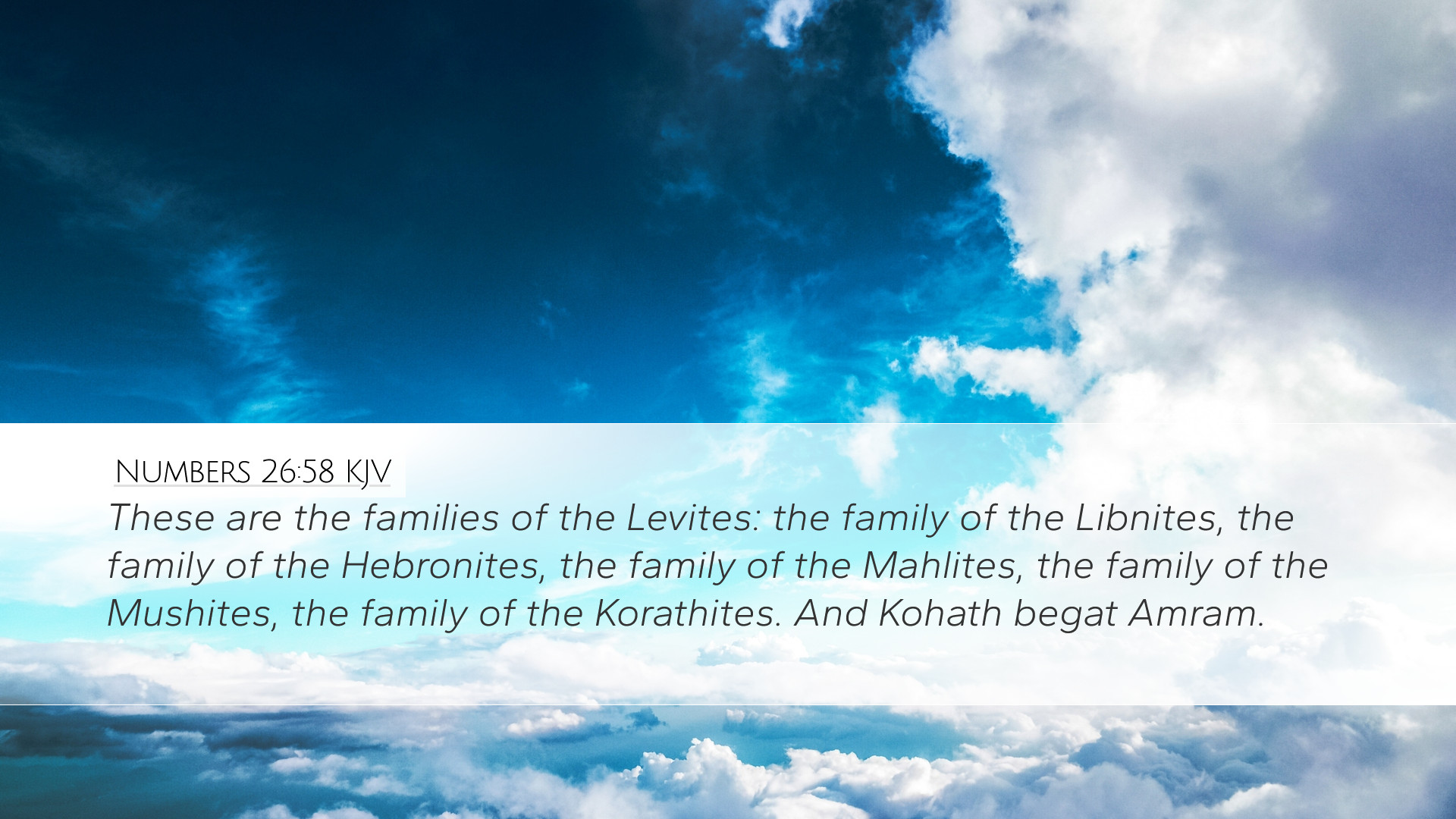Commentary on Numbers 26:58
Numbers 26:58 states: "The families of the sons of Levi were the family of the Gershonites, the family of the Kohathites, and the family of the Merarites: these are the families of the Levites." This verse provides a crucial insight into the division of the Levites, an important tribe among the Israelites, and showcases their roles in the ancient worship practices. Below, we summarize various insights from public domain commentaries to elucidate the significance of this verse.
Overview of the Levite Families
- Divisions of Levi's Descendants: The Levites are organized into three principal families: the Gershonites, Kohathites, and Merarites. Each of these families had specific roles and responsibilities in the Tabernacle worship, which underscores the organizational structure within the priestly tribe.
- Roles Assigned: As detailed in other parts of the Book of Numbers, each family was charged with different tasks related to the transport and care of the Tabernacle. The Gershonites dealt chiefly with the curtains and coverings; the Kohathites were responsible for the sanctuary vessels; and the Merarites managed the frames and pillars of the Tabernacle.
Significance of the Levite Tribe
According to Matthew Henry, the Levites were specifically chosen for their sacred office; their lineage traces back to Levi, one of the twelve sons of Jacob. The importance of their unique standing stems from several theological and practical implications:
- Covenant Responsibility: The Levites were chosen by God to fulfill roles that were crucial for maintaining the covenant relationship between God and Israel. Their service symbolized devotion and holiness.
- Implications of Holiness: The designation of the Levites highlighted the call to holiness within the community. Pastors and theologians often draw from this to emphasize that God’s calling demands a distinct lifestyle dedicated to His service.
The Historical Context
Adam Clarke provides insight into the historical context surrounding this passage. The organization of the Levite families occurred after the census taken in the wilderness and was part of the broader context of Israel's preparation to enter the Promised Land.
- Order and Preparation: The arrangement of the Levite families also symbolizes God's order in every aspect of the Israelite community. Each role within the Tabernacle worship contributed to society's spiritual life and understanding of their covenant with God. For scholars, this emphasis on divine order is critical when studying the Old Testament.
- The Role of Leadership: Each family became a model of leadership and service. Their specific tasks required commitment and faithfulness—qualities that modern church leaders aspire to embody.
Theological Reflections
Albert Barnes notes that the mention of these families aids in appreciating the structure of worship instituted by God. From a theological standpoint, the families of the Levites represent:
- Divine Initiation: The structure of the priestly services was divinely ordained, suggesting that genuine worship must be grounded in God’s instructions.
- Intercession and Mediation: The Levites served as intermediaries between God and the people. Their role foreshadowed the New Testament understanding of Christ as the ultimate mediator.
Practical Application for Modern Readers
This brief segment of scripture serves various practical lessons that resonate with today’s church leaders, seminarians, and scholars:
- The Importance of Structure in Worship: As in the Levite families, church organization today is crucial for effective worship and ministry. Understanding each member's role fosters unity and purpose.
- Faithfulness in Service: The Levites show that commitment to God’s service is paramount. Modern believers are called to reflect this same dedication in their daily lives, emphasizing a life of service.
- Understanding Our Calling: Each family had a unique purpose assigned to them, which represents the unique calling each individual believer has today within the body of Christ.
Conclusion
In conclusion, Numbers 26:58 encapsulates not only the lineage of the Levites but also their divine calling and service within the Israelite community. This passage, when studied in the light of the broader scriptural narrative, invites readers to consider the principles of service, holiness, and divine order that remain relevant for church practice today.


